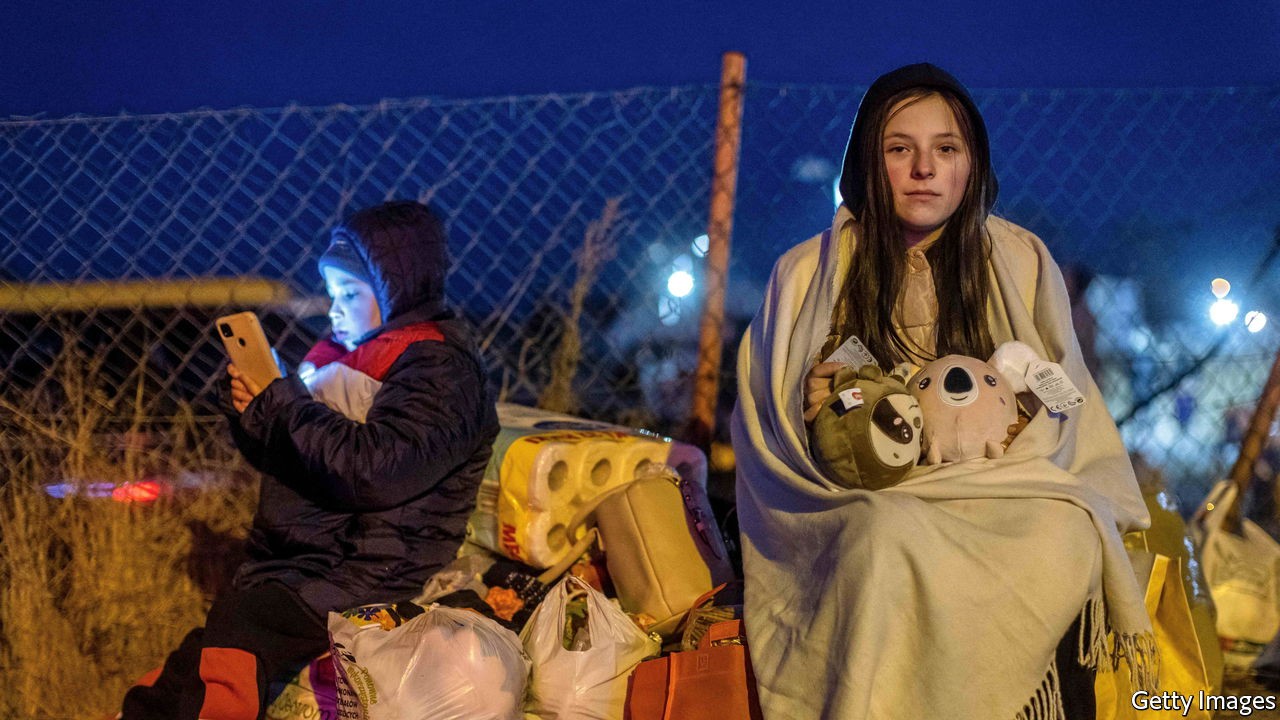LUTSK, IN WESTERN Ukraine, is not near the front lines, but it is within reach of Russia’s bombs. In mid-March they struck the town’s airfield for the second time. Yana Supruniuk, a 29-year-old interior designer, could see the fireballs from her flat. When she plays back the video on her mobile phone she still seems shocked to see it. At 5am on March 23rd, after days of indecision, she and a friend set off for the Polish border. Volunteers picked them up and drove them to Warsaw’s central train station. The pair queued for a ticket to Berlin, where a friend had agreed to put them up.
Ms Supruniuk and her travelling companion are among the newer additions to a colossal wave of refugees fleeing Ukraine, which will soon exceed 4m people. That does not count the 6.5m people displaced within Ukraine by Russia’s invasion. Nearly a quarter of the population has been forced to move. If the war drags on and men, currently barred from leaving the country if they are younger than 60, begin to join the women and children already abroad, the number of refugees could more than treble. That would place Ukraine’s exodus among the largest in history, comparable with that provoked by the first world war.
It is already among the fastest-moving, with roughly 1m people a week leaving the country in the war’s early stages. Although the flow has recently slowed to less than half that, the strain on the governments, UN agencies and NGOs that are handling it is immense. “We’re building the bridge as we’re walking across it,” says a UN official.
The consequences for Europe are highly uncertain but likely to be profound. Much depends on how long people like Ms Supruniuk, who hopes to return home within weeks, stay. If, as seems likely, the conflict continues and the ranks of refugees increase, they will change in lasting ways Europe’s politics, economies and its thinking about migration. So far, the western response has been enlightened and generous. But that could change if governments mismanage the reception and integration of refugees, and disillusionment and fatigue set in.
Already, the crisis has upended assumptions about how Europe reacts to large influxes of people. The Ukrainian exodus is nearly triple the size of the wave of Syrians and others who reached Europe in 2015. Germany and Sweden were initially welcoming, but there was then a surge in support for anti-immigrant politicians all across Europe. This led to a hardening of Europe’s borders, a deal with Turkey to prevent Syrian refugees from proceeding to other parts of Europe, “push-backs” of asylum-seekers arriving by boat and challenges by politicians to the very idea of asylum.
In response to the Ukrainian crisis, Europe has rolled out welcome mats, both metaphorical and literal. On March 3rd the European Union invoked for the first time its temporary-protection directive, giving Ukrainians the right to live, work and receive benefits in 26 of its 27 member countries. (Denmark, which has an opt-out, passed a similar protection law.) They will not face the drawn-out and uncertain process of applying for asylum that awaited those who arrived in 2015, or the confinement to camps inflicted on some. Some of the countries that were previously most averse to asylum-seekers are now among the main destinations for Ukrainians. Poland has taken in 2.2m. Hungary, whose prime minister, Viktor Orban, was the first European leader to build a fence to keep out refugees in 2015, has admitted 340,000. America is joining in. On March 24th President Joe Biden said his country would take in up to 100,000 Ukrainian refugees and contribute $1bn to help Europe cope with the influx. Canada, which has the world’s biggest Ukrainian diaspora outside Russia, has said it will take as many Ukrainians as want to come.
Hundreds of thousands of Europeans have offered rooms in their houses to Ukrainians in need. Poland’s government encourages such generosity by offering hosts 40 zloty ($9) per day per refugee for two months. Britain’s is giving £350 ($460) a month per household, although its forbidding bureaucracy has made it hard for many Ukrainians to come. Italy, which has a large Ukrainian diaspora, has also been welcoming. In the northern province of Modena, the pre-war Ukrainian population of nearly 5,000 had jumped by more than 2,200 as of March 23rd. The authorities are finding places in local schools for refugee children.
The contrast with the reaction to Syrians in 2015 is due not just to the lighter skin and Christian religion of most Ukrainians, though that is surely part of the explanation. It is also that welcoming refugees is part of a mobilisation for a nearby war in which NATO and Europe, although non-combatants, are passionately partisan. Human-rights activists pray that Europe’s spirit of welcome will outlast the war and eventually extend to refugees fleeing more distant conflicts. “This is a time of pedagogy,” says Harlem Désir of the International Rescue Committee, an NGO.
But such hopes depend on integrating Ukrainians successfully into their host countries for however long is necessary—and that is far from guaranteed. Ukraine’s closest neighbours are already feeling strained. Moldova, which has received 370,000 refugees, equivalent to about a tenth of its population, is overwhelmed. Most Ukrainians intend to move on to other countries, but more than expected are staying, in part because most Moldovans speak Russian. Newer refugees, who tend to be poorer and are less likely to have family already in western Europe, may also stay in larger numbers. Moldova is a playground for people-traffickers, who can look and sound like the volunteers who bring people like Ms Supruniuk to safety.
Parts of Poland, too, are buckling. Around 300,000 refugees have come to Warsaw, the capital, increasing its population by 17%. More than 100,000 are in Krakow, the second-largest city, which is usually home to 780,000 people. “[T]he more people, the worse the conditions will be,” says Rafal Trzaskowski, Warsaw’s mayor. At the city’s train station a large map in the blue and yellow of the Ukrainian flag shows 20 Polish cities and the times it would take to reach them. The text encourages refugees “not to be afraid” of moving on to smaller cities.
Mr Trzaskowski thinks a “European or even global system” is needed to move refugees to places with the capacity to accommodate them. Nearly three-quarters of Poles agree with him, according to a recent survey, although the national government is at pains to say that refugees should decide for themselves where to settle. Mr Trzaskowski’s plea is part of a chorus: Annalena Baerbock, Germany’s foreign minister, proposes “humanitarian hubs” to funnel refugees across the EU and to America and an airlift to relieve Moldova. What is needed, says Mr Désir, is a mechanism to match the huge supply of refugees with the large demand across Europe to take them in, before that enthusiasm ebbs. “A lot of places say they are ready,” says Mr Désir, but refugees often lack the information to know where to go. The problem will grow as the proportion of refugees with connections in Europe inevitably falls.
Countries on the route taken by refugees in 2015, from Greece to Belgium, have greatly improved their ability to register and process them. Some, such as Germany, passed laws and set up institutions to integrate refugees. Schools in Berlin, for example, are restarting “welcome classes” introducing new arrivals to the German language and way of life. But since asylum procedures have been waived, responsibility immediately falls on ministries and municipalities that are unused to sudden increases in demand for services. In Belgium, which is expecting some 200,000 Ukrainians, “agencies responsible for welfare benefits are just panicking,” says Hanne Beirens of the Migration Policy Institute in Brussels.
For economies, refugees could be both a burden and a boon. Goldman Sachs, a bank, estimates that the EU’s four biggest countries will spend nearly 0.2% of GDP to support the influx, assuming 4m refugees come to the region. That is a modest sum, but it comes on top of other war-related spending. All told, budget deficits in the four are likely to increase by 1.1% of GDP this year.
Yet in a grander sense, the timing is propitious. The unemployment rate in the Eurozone dropped to a record low of 7% at the end of last year. In Germany and Poland the jobless rate is less than half of that. A quarter of enterprises said in January that shortages of labour were curbing their output, according to the European Commission—the highest share on record. Economists fear that the ageing and shrinking of Europe’s population will eventually lower living standards. Ukrainians may provide an unexpected demographic boost.
Ukrainians already in Germany have higher qualifications than did Syrian refugees, which should help them find work. The relative abundance of work means that there is little risk that Germans will accuse the newcomers of taking their jobs. The unemployment rate is likely to rise just a few tenths of a percentage point before falling back again, according to a recent report by Deutsche Bank. In the long run, taxpaying Ukrainians may make a net contribution to the budget rather than draining it.
But such cheery forecasts assume that economies will remain strong and unemployment low—assumptions that the surge in energy prices linked to the war may undermine. The forecasters may also be overestimating how much work single mothers, traumatised by their flight from Ukraine and worried about the husbands they left behind, will be able to do, especially where day-care places are scarce and expensive.
If the war grinds on, economies slow and governments fail to provide the newcomers with housing, services and jobs, Europe’s welcome mats could be withdrawn. Dissent can already be heard in some overburdened countries. In Romania a nationalist fringe contends that Ukraine, not Russia, is the enemy. In Moldova some Ukrainians’ cars have been vandalised. Filippo Grandi, the head of the UN’s refugee agency, fears that hostility will spread. “Solidarity might exhaust itself and provoke a backlash,” he warned in an interview with Politico, a news website. That would be a victory for Mr Putin. And it would be yet another ordeal for Ms Supruniuk and the millions of others fleeing a pointless war.



